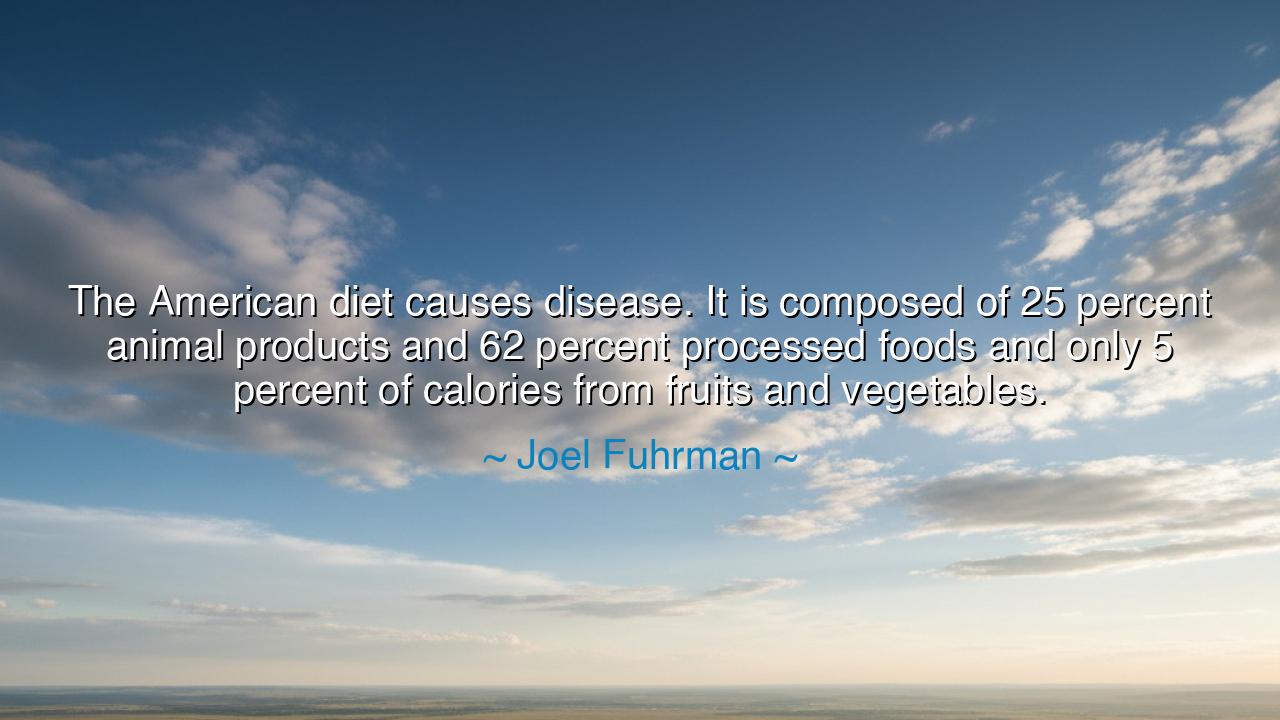
The American diet causes disease. It is composed of 25 percent
The American diet causes disease. It is composed of 25 percent animal products and 62 percent processed foods and only 5 percent of calories from fruits and vegetables.






In the vast expanse of human history, where wisdom has been passed down like the most sacred of scrolls, one truth stands firm: health is not found in excess or indulgence, but in balance. The words of Joel Fuhrman—"The American diet causes disease. It is composed of 25 percent animal products and 62 percent processed foods and only 5 percent of calories from fruits and vegetables"—reflect a timeless wisdom that echoes through the ages. The American diet, so consumed with meat and processed foods, fails to honor the ancient principle that true vitality is not found in the indulgence of excess, but in the nourishment of the earth's simplest offerings.
In the ancient world, the Greeks, led by thinkers like Hippocrates, understood the deep connection between diet and health. Hippocrates, the father of medicine, warned that disease arises when the balance of the body is disrupted. "Let food be thy medicine," he famously said, believing that what we consume plays a pivotal role in either fostering or eroding our health. The Greeks valued whole foods—grains, fruits, and vegetables—as the foundation of well-being. They knew that excessive consumption of meat and indulgence in rich, processed foods led to a weakening of the body’s natural defenses. Fuhrman’s critique of the American diet is a modern echo of this ancient wisdom, revealing the dangers of a lifestyle centered around foods that do not nourish, but rather, overburden the body.
Similarly, in ancient Rome, Cicero, the great philosopher, wrote of the importance of moderation in all things, including diet. The Romans, though famous for their indulgent feasts, also understood that health lies in balance. Cicero spoke of the virtues of eating simple, plant-based foods—meals that nourished the body without excess. He recognized that indulgence in rich foods like meat could weaken the body and lead to disease. Fuhrman’s words mirror this Roman understanding, calling out the modern diet as one that promotes imbalance and disease by placing too much emphasis on animal products and processed foods, while neglecting the fundamental life force that comes from fruits and vegetables.
In the ancient Indian tradition of Ayurveda, diet is seen as a reflection of one's spiritual and physical balance. Ayurvedic texts teach that food should be viewed as medicine, and that the key to a long, healthy life lies in consuming whole, natural foods that are aligned with the body’s needs. In this tradition, meat and processed foods are seen as heavy, difficult to digest, and detrimental to the body’s natural equilibrium. Just as Fuhrman points out, the modern American diet, laden with animal products and processed foods, disrupts the body’s natural flow and invites disease. The Ayurvedic wisdom urges us to center our meals on plant-based foods, recognizing that these foods sustain and nourish the body with their lightness and purity.
Fuhrman’s statement calls us back to the ancient principles of balance and nourishment. The American diet, with its high consumption of meat and processed foods, has become a symbol of modern excess—an imbalance that fosters disease rather than health. The ancient philosophers, from the Greeks to the Romans to the practitioners of Ayurveda, all understood that health is not achieved through indulgence, but through the nourishment of simple, whole foods. By centering the diet on fruits, vegetables, legumes, and whole grains, we align ourselves with the age-old wisdom that has sustained generations.
The lesson, then, is one of profound wisdom and moderation. Just as the ancients saw food as both medicine and nourishment, so too must we choose our sustenance with great care. By avoiding the excesses of animal products and processed foods, we can reclaim the balance that has been disrupted by modern habits. Like Hippocrates, Cicero, and the practitioners of Ayurveda, we must understand that health is a reflection of the choices we make daily. Our diets should be rooted in the whole, the pure, and the nourishing, foods that come from the earth and sustain us in body, mind, and spirit.
In our own lives, let us take this wisdom to heart. Let us be mindful of the foods we consume, recognizing that the modern diet of excess and imbalance can only lead to disease. Just as the ancients understood the importance of eating in harmony with the rhythms of nature, so too must we. By centering our diets on fruits, vegetables, beans, nuts, and seeds, we not only nourish our bodies but honor the wisdom that has been passed down for thousands of years. Let us embrace this simple, wholesome path, and in doing so, create a life that is balanced, vibrant, and free from the burdens of disease.






AAdministratorAdministrator
Welcome, honored guests. Please leave a comment, we will respond soon